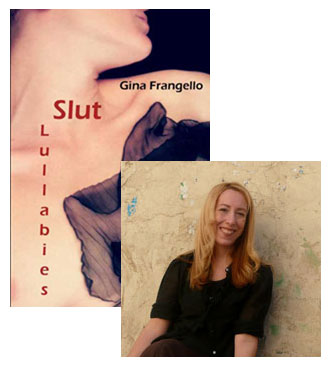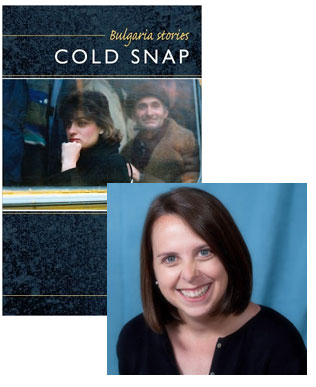Gina Frangello Gives “The Hitchhiking Game” Thumbs Up

The characters in Gina Frangello‘s Slut Lullabies are living in extreme desperation: A woman watches her husband deteriorate from mental illness and wonders when their money will run out; a teenage girl comes up with a desperate plan to save her stepmother from her father’s abuse; a grad student already addicted to painkillers is on the verge of making a big mistake with one of her classmates. Gina’s in New York this weekend—appearing at ZieherSmith Gallery Saturday night and Word Brooklyn late Sunday afternoon—and to celebrate, I invited her to zero in a source of inspiration—which sounds very much like her own stories: painful to read at times but difficult to look away from once you’ve started.
Nobody writes sex like Milan Kundera. If he has a counterpart in American literature, it is probably Mary Gaitskill, though of course Gaitskill is of a different generation; by the time her debut collection Bad Behavior came out, Kundera had written some half-dozen books, some of which were first published in Czechoslovakia when she was a small child (and before I was even born). If one investigates Kundera’s American contemporaries, including those “pioneers” of erotic literary fiction such as Philip Roth and John Updike, the Americans can come across almost as adolescent boys titillated by their own naughtiness. It would take decades for American writers to truly explore eroticism, the power dynamics of gender/sexuality, and writing sex as a window to characterization with the nuance, complexity and sophistication Kundera had mastered before the American sexual revolution even began.
And since it is hard to toss a… well, in honor of Kundera, let’s say a bowler hat… without it landing on sex in one of his stories, to pick one that most exemplifies his prowess in this arena could seem difficult. However, the one story that knocked me on my ass when I first read it at the age of 20, and that I find myself teaching in Creative Writing classes again and again over the years is “The Hitchhiking Game” from Laughable Loves.
I love it for its purity, in a way. Most of Kundera’s work, while always carrying a powerful undercurrent of eroticism, concerns other matters on a “plot” level: heavy-hitting topics from the Prague Spring or the Communist repression of humor to riffs on classical music or Goethe. In “The Hitchhiking Game,” by contrast, the story is deceptively simple. A man in his late 20s and his girlfriend (referred to only as “the young man” and “the girl,” à la Hemingway) have a scant two-week holiday from their dreary Czech jobs and, on their first day of a trip, fall almost accidentally into a role-playing game where the girl pretends to be a seductive hitchhiker the young man has picked up. Jealousy—first hers that her slightly-older lover has in fact been in this sort of casual pick-up situation with many women before her; then his at seeing his shy and innocent girlfriend, whom he has on a pedestal, shedding her inhibitions and revealing a primal, anonymous sexuality—begins to flare as the game escalates in intensity.
21 May 2010 | selling shorts |
Cynthia Morrison Phoel and the Weight of the Past

I haven’t read Cold Snap yet, but after Tracy Winn’s endorsement yesterday, I’m really looking forward to it. I’m sure it will be great, because when it comes to short stories, I can count on SMU Press to deliver the goods—or rather, I could count on them, since it increasingly looks as if the university will follow through on its plans to shut down the press. So Cynthia Morrison Phoel may be one of the last authors they publish for a long while, and that’s a shame. In her essay, Cynthia pays tribute to Katherine Shonk, who has been seen at Beatrice before; somehow, I missed the news of Shonk’s debut novel, Happy Now?, coming out last month, so I’m going to have to track that down, too…
My forthcoming book, Cold Snap: Bulgaria Stories, takes an insider’s look at life in a small Bulgarian mountain town. I served in the Peace Corps in such a town; when I started to think about Bulgaria through my fiction, I found myself wanting to not just visit, but to re-enter people’s houses, minds, and hearts. To spend some time in their tippy stilettos or sturdy handmade loafers.
In her exquisite collection, The Red Passport, Katherine Shonk masters this insider’s stance, revealing post-Communist Russia with keen sensitivity. Re-reading these stories for the second or third time, one of the things that impressed me most was not the squeeze and chafe of her characters’ shoes so much as the persistent weight of the past on their stories.
This is as it should be. As Eastern European societies have struggled to come to terms with new realities, one way to make sense of the present is to see it in relation to the past. Shonk has the wisdom to know that this relationship is not uniform—that the relative value of past and present varies by character.
20 May 2010 | selling shorts |

 Our Endless and Proper Work is my new book with Belt Publishing about starting (and sticking to) a productive writing practice.
Our Endless and Proper Work is my new book with Belt Publishing about starting (and sticking to) a productive writing practice. 
